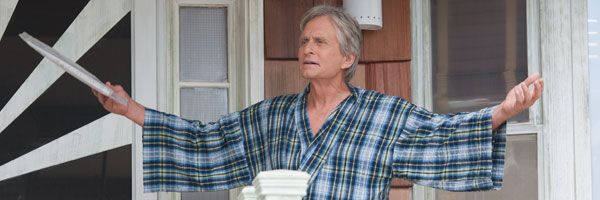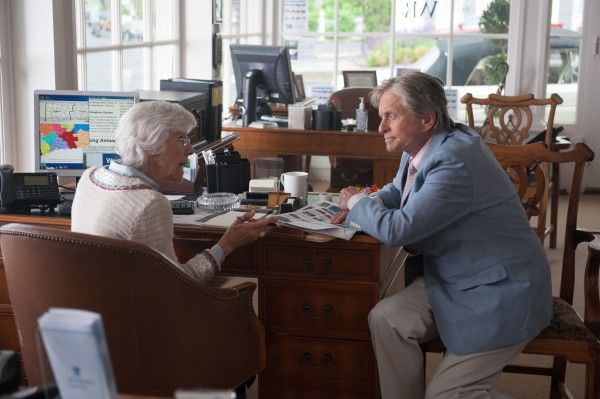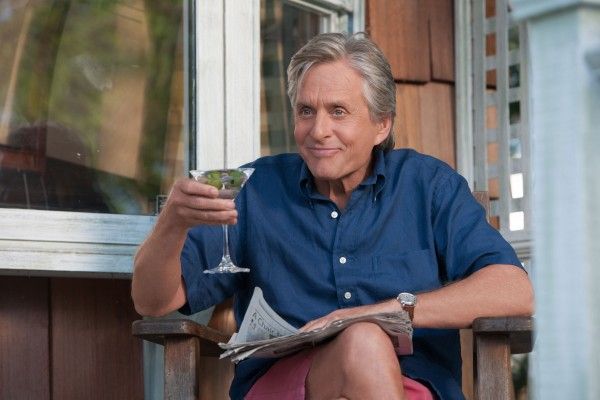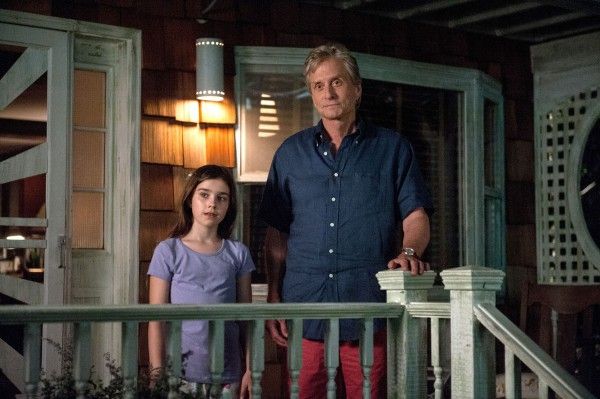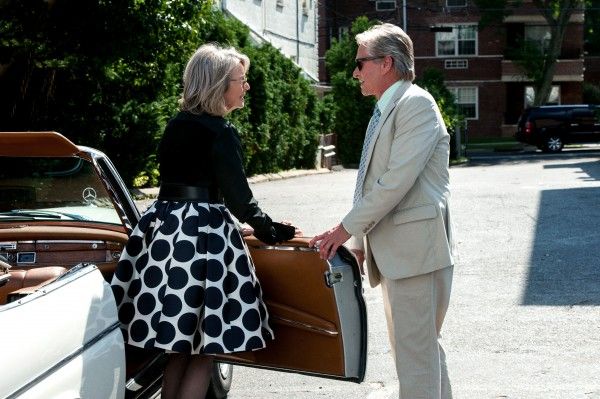It’s been nearly 20 years since American President, but Michael Douglas is back in front of the lens for Rob Reiner in the July 25th release, And So It Goes. Douglas leads the film as Oren Little, a real-estate agent with absolutely no filter and a sour attitude. All Oren wants to do is sell one last house, retire and live out his days sipping martinis on his waterfront fourplex porch, but when he gets stuck taking care of his granddaughter (Sterling Jerins), he’s got no choice, but to finally start thinking of someone other than himself.
At the beginning, Oren’s busy shooting a dog with a paintball gun so, needless to say, Douglas had his work cut out for him trying to get Oren on the audience’s good side, but while participating in a roundtable interview, Douglas told us that’s exactly what he wanted. He likes that type of challenge. Hit the jump to read more about that, Douglas’ difficult canine co-star, what it was like reuniting with Reiner, working with Diane Keaton for the first time and more. And in case you missed it, click here to read what Douglas said about bringing Ant-Man to Comic-Con.
Question: This is such a complicated character. Did you connect to him right away?
MICHAEL DOUGLAS: Right away! [Laughs] Right away. I grew up in Westport, Connecticut, so I knew that whole wasp martini scene growing up, pink socks. That part of it, the exterior, I kind of knew pretty well. And, you know, Mark Andrus, As Good As It Gets, everything, he’s the real deal. It’s a really good script, really good screenplay and, you know, he set up all the pieces. You see [my character] up in New England, Fairfield County all the time, ’07, ’08 came around, lost their fortune, all of a sudden he had this big house and lost that, his wife got cancer, he took care of her for two years. Probably all he did was [be a] caretaker for two years until she died. Certainly a son with drug problems in federal prison. So yeah, [laughs] it was in the wheelhouse.
What was your first impression when you read the script? Was there anything about it that made you think, ‘This is working, but I’ve got some ideas for that?’
DOUGLAS: No, he’s good. I mean, Mark Andrus is really good. I thought he had a nice arc. Love stories are love stories. This is certainly about an older couple, but I thought the whole idea of the fourplex was a great way to introduce a bunch of characters together. At the same time, you’re not even quite sure if Diane’s character and I are gonna happen because of both the adversity and the other characters. I liked that part. But no, it was a really good script. Rob’s company was producing it. Rob wasn’t gonna direct it at first. He was involved in another picture. And then the director that was gonna be involved couldn’t get bonded, and then Rob’s picture didn’t work out so Rob came back and then Diane was there and I was like, ‘Wow,’ because I’ve admired her for so long and wanted to do something with her. We talked about it. Some of these actors are really smart and they just pick up the phones and say, ‘Let’s get together for coffee. Maybe we can find something.’ I was never like that.
Diane said she came up with a backstory for her character. There is a line where her character says to yours, ‘Were you always like this?’ We get the sense that the death of his wife left him bitter, but what’s your interpretation? Do you think he was always a little like that or was it a drastic change due to grief?
[WARNING: There is a mild spoiler in the answer to this question.]
DOUGLAS: Yeah, he was. Far be it from me to compare it to an Afghan War veteran coming back, but he just got killed. He just got clobbered. He wasn’t prepared to, all of sudden, lose everything financially, to lose his wife, his son failed. So he, in seven, eight years, had really embittered himself. He was a serious drinker. Drank alone a lot and isolated himself, so no, I like to think that from what you see at the end of the movie, that he rediscovered his soul and his heart, that had been there. Granted, [he] probably was really hard working and may have not paid as much attention to his family, to his son as he should have. But no, I thought there was a decent person there. I mean, he’s funny. Even in his snide darkness, the guy had a good sense of humor. I wouldn’t say he was religious. That was one note I had about him. He certainly was not religious.
How is it for you playing characters who aren’t particularly nice so often?
DOUGLAS: Yeah, I do. I make kind of a practice out of that. I don’t even know why, but my entire career is contemporary films. Entire career! There’s no period movies – there’s one – but there’s no period movies, no special effects movies. I just do character studies and so, some of them are gonna bump into each other, but I love the challenge, with a good script. I love the challenge of playing not a very pleasant or attractive character that seduces an audience or wins an audience over by the end. I don’t know why. I’ve somehow just liked that challenge.
You and Diane have great sparks in this, but you and Sterling really do, too. She’s a great little actress. What was it like working with her?
DOUGLAS: Well, a little scary, you know? Nothing worse than being upstaged by – I mean, both Diane and I went, ‘Aw, Jesus. This kid’s good. This kid’s really good.’ No, it was wonderful. Diane and I were talking about the different ways we work and what you see with Diane is what you get, which is fabulous. I mean, she talks about, ‘I’m not an actress. I’m just a person.’ She’s totally impulsive. Every scene would start with her running on the set with earplugs listening to music, not hearing a thing and me, I’ve already thought about what I’m gonna do and all of that. [With her it’s], ‘Camera rolling, ready, action,’ and she pulls out the earphones and here you go. And actually it was great because I’m not used to it, so it’s unpredictable. It makes you lean in as to what is she gonna do, where is she gonna go and that was great.
But getting back to Sterling, as producer, I look at the whole movie. I know my part, I try to do it, but you’re just so blessed when you’ve got actors that are hitting it out of the park. And this little girl in that opening scene when she says goodbye to her dad, she crying and Rob is going, ‘No, no please. We’ve gotta come in closer and closer.’ She could cry on cue 15 times in a row. It’s great and it’s something I actually learned from Paul Newman. Paul Newman always made a big effort of surrounding himself with as good of actors as he could. He wasn’t worried about himself because the synergy is bringing all of these pieces together.
She also melts Oren’s heart in a way that makes the audience fall in love with him.
DOUGLAS: Yeah, she does. She wins him over. A lot better than the dog.
Was there more material with the dog? I did want to see a little more of Paint.
DOUGLAS: That dog was the biggest pain in the ass. It was the only thing in the whole movie I was upset about. I said, ‘Who auditioned this dog? This f*cking dog can’t do anything.’ Anything!
Rottweilers are very hard to train.
DOUGLAS: Yeah, they are. It was a bad call. The dog was the only miscast, bad thing and we worked around it.
It wasn’t even cute.
DOUGLAS: No! I’m sure Rob wouldn’t tell you, but that was left up to somebody who didn’t know what they were doing. This dog could not do anything. I mean, normally these dogs, they read the script, they know the certain things they’ve gotta do. [Here], nothing.
One of the things your character would probably say about himself is, ‘I’m just being honest.’ Looking at this character, what do you think he was dishonest about in his life that he had to come to terms with?
DOUGLAS: Whoa. That’s a heavy-duty question. Probably his selfishness, his self-involvement. The act of giving to his wife when she was sick drained him and quid pro quo is the way he would look at it in terms of how much more I’ve given than I’ve received, so I think he was a pretty self-involved guy. His selfishness was something he never really fessed up to.
We asked Diane about her first memories of meeting you. What are yours of the first time you met her?
DOUGLAS: Really, on the picture. We, in passing as we said to each other, [were] sort of blasé in seeing each other at a couple of parties and a couple of awards events, but never had a conversation. Just brief, in passing. But, to me, I love Rob and I had the opportunity to have worked with him before on American President, but Diane is such a joy. It was just such a treat and I feel really blessed to have that in my career now, too. I’ve worked with a lot of different ladies and she was special.

